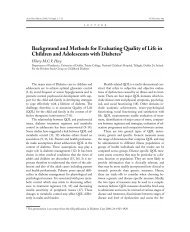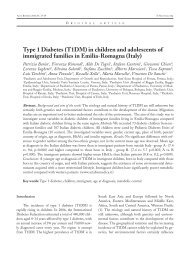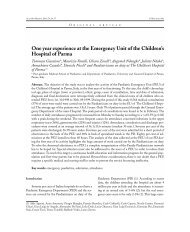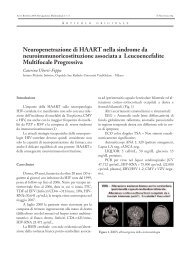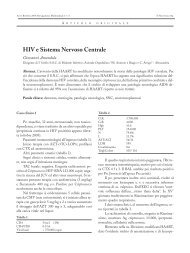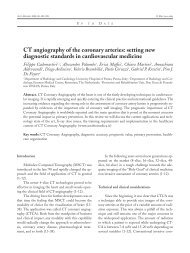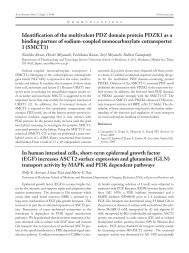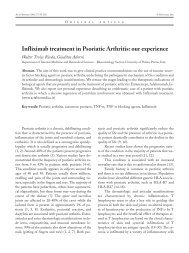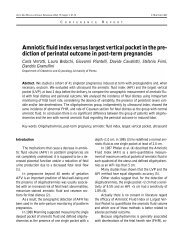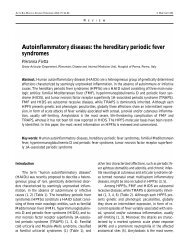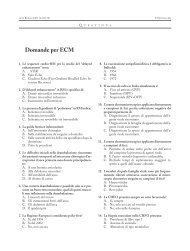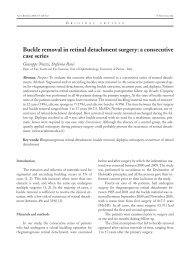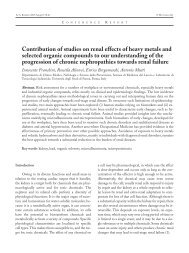In memory of professor Domenico Mancia - Acta Bio Medica Atenei ...
In memory of professor Domenico Mancia - Acta Bio Medica Atenei ...
In memory of professor Domenico Mancia - Acta Bio Medica Atenei ...
Create successful ePaper yourself
Turn your PDF publications into a flip-book with our unique Google optimized e-Paper software.
ACTA BIO MED 2005; 76; 60-61 © Mattioli 1885<br />
<strong>In</strong> <strong>memory</strong> <strong>of</strong> pr<strong>of</strong>essor <strong>Domenico</strong> <strong>Mancia</strong><br />
Gian Camillo Manzoni<br />
Department <strong>of</strong> Neuroscience, Section <strong>of</strong> Neurology, University <strong>of</strong> Parma, Parma, Italy<br />
(giancamillo.manzoni@unipr.it)<br />
<strong>Domenico</strong> <strong>Mancia</strong>, full pr<strong>of</strong>essor at the Department<br />
<strong>of</strong> Neurology, University <strong>of</strong> Parma, sadly passed<br />
away on 26th August 2004 aged 69, after a brave, but<br />
useless, fight against a serious illness for over a year.<br />
He was born in Civitavecchia on 18th May 1935,<br />
but he regarded himself to all effects and purposes as<br />
a native <strong>of</strong> Polverigi (Ancona), where he moved to<br />
aged just three with his family upon appointment <strong>of</strong><br />
his doctor father as a general practitioner there.<br />
After graduating in Medicine and Surgery at the<br />
University <strong>of</strong> Siena, he embarked on his career in 1964<br />
at the Neurology Clinic <strong>of</strong> the University <strong>of</strong> Parma,<br />
which he never left, making his way up the academic<br />
ladder to become a specialist in Clinical Nervous and<br />
Mental Disorders in 1966, a specialist in Radiology<br />
and Nuclear Medicine in 1968, full assistant in 1969,<br />
O B I T U A R Y<br />
qualified university teacher <strong>of</strong> Neurology in 1972, associate<br />
pr<strong>of</strong>essor in 1980 and full pr<strong>of</strong>essor in 1986.<br />
From 1st November 1990 he was Head <strong>of</strong> the Neurology<br />
Clinic at the University <strong>of</strong> Parma until May<br />
2003, when he was forced to take early retirement due<br />
to health reasons. From 1996 to 2003 he was also the<br />
Head <strong>of</strong> the Post-graduate School <strong>of</strong> Neurology <strong>of</strong> the<br />
University <strong>of</strong> Parma, and from December 2001 Head<br />
<strong>of</strong> the Department <strong>of</strong> Neuroscience at the University<br />
Hospital <strong>of</strong> Parma.<br />
From the very onset (thanks also to the teachings<br />
and invaluable suggestions <strong>of</strong> such luminaries as Fabio<br />
Visintini and Mirko Carreras), his research interests<br />
were focused on both experimental and clinical neurophysiology.<br />
Through study periods abroad, in particular<br />
at the Timome Hospital in Marseilles, led by<br />
Henry Gastaut, he was able to improve scientific<br />
knowledge in the field <strong>of</strong> electroencephalography and<br />
epileptology and to complete the acquisition <strong>of</strong> a correct,<br />
effective methodological approach to clinical research,<br />
an acquired knowledge that was to become an<br />
inseparable part <strong>of</strong> his academic life.<br />
Every great celebrity in the university world (and<br />
<strong>Domenico</strong> <strong>Mancia</strong> was to all effects and purposes one<br />
<strong>of</strong> these), only acquires such status by self-distinction,<br />
not just in terms <strong>of</strong> the mandatory didactic and research<br />
attributes, but also for other talents that determine<br />
unicity. Against the backdrop <strong>of</strong> an inflated and<br />
increasingly anonymous university environment undergoing<br />
a difficult transitional phase from a “baronial<br />
world”, full <strong>of</strong> qualities good and bad, which is inevitably<br />
dwindling away to be replaced by a modern conception<br />
<strong>of</strong> knowledge management that, in spite <strong>of</strong> its<br />
difficulty in becoming established, will only serve to
<strong>In</strong> <strong>memory</strong> <strong>of</strong> pr<strong>of</strong>essor <strong>Domenico</strong> <strong>Mancia</strong><br />
bring with it a felicitous blend <strong>of</strong> culture and efficiency,<br />
the figure <strong>of</strong> <strong>Mancia</strong> stands out for a series <strong>of</strong><br />
characteristics: organizational intelligence, innate<br />
communicative skills, explosive vital energy, a propensity<br />
for constructive dialogue, thinking and acting<br />
without any prejudice whatsoever and an enormous<br />
capacity for achieving goals, however ambitious or arduous,<br />
with perspicacity and perseverance.<br />
It was thanks to these characteristics that in the<br />
Nineties the Neurology Clinic <strong>of</strong> the University <strong>of</strong><br />
Parma, under <strong>Mancia</strong>, made a considerable impact,<br />
achieving renown on a national level, and demonstrating<br />
great scientific and organizational development<br />
in the field <strong>of</strong> neurophysiology.<br />
Thanks to his many talents, <strong>Mancia</strong> was also a<br />
cardinal point <strong>of</strong> reference for the Faculty <strong>of</strong> Medicine,<br />
whose members would never hesitate to draw from<br />
his experience and wisdom every time there was a<br />
complex problem to be solved.<br />
However, <strong>Domenico</strong> <strong>Mancia</strong> was not just a prestigious<br />
figure within his pr<strong>of</strong>essional sphere; his natural<br />
tendency not to shut himself <strong>of</strong>f in his own particular<br />
field, gratifying and fruitful though it was, but<br />
reach out to others, led him to express his strong personality<br />
in civil concerns and in the arts as well.<br />
A staunch believer in the Socialist Party, he<br />
enjoyed dialogue with all, even with those whose ideas<br />
differed from his own, and with the utmost naturalness<br />
he would succeed in defusing the most complicated<br />
situations to achieve target objectives.<br />
From 1975 right through to 1995, he was mayor<br />
<strong>of</strong> Polverigi, the town to which he was bound by a<br />
pr<strong>of</strong>ound friendship, and which, to his immense joy, in<br />
July 2002 gave him honorary citizenship for his important<br />
contributions to the social, cultural and economic<br />
growth <strong>of</strong> the town community.<br />
Open to the multiple aspects <strong>of</strong> cultural life and<br />
always intellectually drawn towards new forms <strong>of</strong> expression,<br />
in 1977 he instituted the <strong>In</strong>ternational <strong>In</strong>teatro<br />
Festival, one <strong>of</strong> the most influential in Europe.<br />
Now, thanks to his enthusiasm, authority and ongoing<br />
efforts, <strong>In</strong>teatro, <strong>of</strong> which Pr<strong>of</strong>. <strong>Mancia</strong> was president<br />
until 1981, has become the Teatro Stabile di <strong>In</strong>novazione,<br />
a vitally important point <strong>of</strong> reference in the field<br />
<strong>of</strong> study <strong>of</strong> art and cultural innovation, a showcase for<br />
talented youngsters, a meeting place for artists invol-<br />
61<br />
ved in the contamination <strong>of</strong> the languages <strong>of</strong> entertainment.<br />
<strong>Domenico</strong> <strong>Mancia</strong> was certainly an intelligent,<br />
efficient and modern university pr<strong>of</strong>essor, a thorough,<br />
conscientious doctor, a staunch ally <strong>of</strong> his patients, an<br />
efficient, far-sighted manager, a level-headed, democratic<br />
and knowledgeable politician and an inquisitive,<br />
practical intellectual, but above all else he was a person<br />
<strong>of</strong> great, unparalleled humanity.<br />
He could soon get along with everyone, and<br />
though retaining the same manner was at ease with<br />
young and old, powerful and humble, rich and poor,<br />
cultured and uneducated, conceited and modest and<br />
arrogant and shy people alike. He loved life in all its<br />
various aspects and was extremely tolerant <strong>of</strong> those<br />
whose ideas or ideals differed partially or even completely<br />
from his own. There was only one thing that he<br />
really could not stand, may be because it was the direct<br />
opposite <strong>of</strong> the way he was: hypocritical moralism put<br />
on to disguise base personal interests.<br />
<strong>Mancia</strong> was a jolly and enormously likeable person;<br />
he would always give invaluable advice and concrete<br />
help without making a point <strong>of</strong> it. He was always<br />
ironic, and it <strong>of</strong>ten looked like he never even took himself<br />
too seriously. I rarely saw him sad: there was the illness<br />
and subsequent death <strong>of</strong> his mother; and then,<br />
during the last few months <strong>of</strong> his own life, possibly due<br />
to the incredible realization that he would have to leave<br />
his dear wife, Anna, and beloved daughter, Ilaria.<br />
I will never forget one afternoon at the beginning<br />
<strong>of</strong> autumn several years back when, with his customary<br />
solicitous hospitality, taking advantage <strong>of</strong> a few<br />
hours in-between congressional obligations, he took<br />
me, along with several other friends and colleagues, to<br />
visit the outskirts <strong>of</strong> Siena, which he knew well from<br />
his university days. At one point he and I were alone<br />
together as an enigmatic sun sank gently beyond the<br />
horizon. I was taken aback by his confession, delivered<br />
with a sad expression in his eyes that I had never before<br />
seen in him, <strong>of</strong> his great love <strong>of</strong> sunsets - he had<br />
always found them mesmerizing. The same expression<br />
was in his eyes during the last days <strong>of</strong> his illness: <strong>Domenico</strong><br />
<strong>Mancia</strong> passed away towards the end <strong>of</strong> August,<br />
aged 69, just like an inevitable mysterious sunset,<br />
marking the end <strong>of</strong> yet another summer and <strong>of</strong> a great<br />
man who was so full <strong>of</strong> life.



